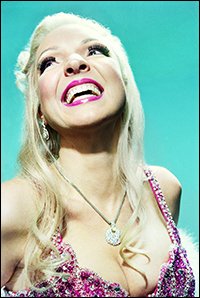
When the opera Anna Nicole received its world premiere at the Royal Opera House, Covent Garden in Feb. 2011, the critics were intrigued by this audacious new work. While it was dubbed "spankingly naughty," "flamboyantly vulgar," and "outrageous," the work earned high praise as "a fabulous show," a "deeply moving new opera" and "quintessentially operatic fare."
Written by British composer Mark-Anthony Turnage and the British librettist Richard Thomas, Anna Nicole is about to have its American premiere at the Brooklyn Academy of Music, where it runs Sept. 17-28. This is a co-production with the New York City Opera, with director Richard Jones and his team reprising their dazzling, colorful London production that revels in the collision of high and low culture.
The opera is based on the life of the Anna Nicole Smith, the voluptuous blonde sex symbol who became famous as a Playboy model, reality TV star and then as a wife to an octogenarian billionaire. She was a tabloid sensation, a celebrity in life and then in death when, at the age of 39, she died from a drug overdose.
"I don't think anyone since Marilyn Monroe had this kind of popularity," said Steven Sloane, who conducts the New York City Opera orchestra for this run. "We've all heard so much about Anna Nicole Smith, that her fame already generates a lot of interest."
Such salacious fare might not seem like an obvious choice for grand opera, but as created by Turnage and Thomas, Anna Nicole becomes a tragic operatic heroine — her story is a rags-to-riches tale of a woman who dreams of fame, yet yearns for love. Soprano Sarah Joy Miller, who said she's "thrilled and inspired" to have landed this unusual diva role, sees Anna Nicole's character rooted within an opera tradition.
"Although her story is certainly unique and not exactly like any other opera heroine, I would say she is most similar to Manon or maybe La Bohème's Musetta. Manon and Musetta were scandalous creatures for their time period," said Miller. (In Massenet's opera, Manon is introduced as a fifteen-year-old innocent girl bound for the convent who is lured into a life of gambling and prostitution; the flirtatious Musetta uses a rich, elderly patron to pay her way.) "The difference with Anna Nicole is that the scandalous details of her life still really resonate with us as being scandalous," added Miller.
Of course, opera composers have long been drawn to sex and scandal as topics for opera. If nothing else, the sensational elements — courtesans and rich, older gentlemen — tended to create buzz in advance of an opening. Nine years before Massenet's opera Manon opened in Paris, Bizet's Carmen outraged audiences in 1875 because of its apparent vulgarity and the tantalizing undertow of sex to drive the melodrama. So Anna Nicole seems to fall within this tradition. Is it fair to say that the opera is a modern story with an old-fashioned morality?
Not exactly, said Miller. "I would agree that it is a modern story, but I think the moral is difficult to fully define. Anna's life has certainly led me to think a lot about fame; how we prize it, how we lift up, then destroy those who have it and how we chase it, each of us in our own way," she said. "Whether there is a definitive moral or not I'm not sure."
 |
||
| Sarah Joy Miller as Anna Nicole |
||
| Photo by Pari Dukovic |
"It's a fabulous piece on its own merits," said maestro Sloane, who described it as an opera (it's through-sung) that also draws on many voices from musical theatre. The sound world that Turnage has created is essentially tonal — a modernist score that also embraces jazz, blues and cabaret.
For Miller, the vocal writing helped shape her understanding of the character of Anna Nicole. "The score is both exhilarating and challenging. There are many jazz and musical theatre elements but the vocal lines of Anna's part are definitely written for an operatic voice," she said. "Because I am on stage for the entire show, and singing most of the time, the most difficult thing has been gauging my physical and vocal stamina. A lot of the vocal lines in the beginning are quite low and speech-like, which I think help to convey the character's personality with clarity."
In addition to the opera voices — which also includes tenor Robert Brubaker (who plays the oil billionaire J. Howard Marshall II), and baritone Rod Gilfry (who plays Anna Nicole's lawyer/lover) — Anna Nicole also features musical theatre singers, and actors, including James Barbour (playing Anna Nicole's father), Mary Testa (playing Anna Nicole's aunt and Stephen Wallem (who plays a sleazy trucker from Texas). All this adds up to a decadent circus that brings full-throated coloratura onto the same stage as seductively swooning waltzes and Kurt Weill-inspired cabaret.
"Anna Nicole is a distinctly American topic written by a British composer," said Sloane. "It's a work of the highest musical and dramatic quality. I believe it has found a place within the opera world."










